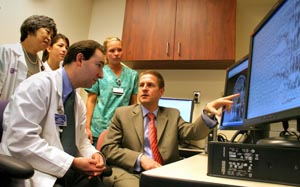New Northwestern Center Targets Epilepsy
 Six hundred students danced for CURE and not necessarily to The Cure, an English post-punk band, during Northwestern’s 30-hour Dance Marathon 2007 held in early March. Their around-the-clock efforts resulted in a donation of $423,028 to the Chicago-based Citizens United for Research in Epilepsy and a boost in awareness about this disease. Epilepsy, which afflicts more than 3 million Americans, is the third most common neurological disorder in the United States after Alzheimer’s disease and stroke, according to the national Epilepsy Foundation.
Six hundred students danced for CURE and not necessarily to The Cure, an English post-punk band, during Northwestern’s 30-hour Dance Marathon 2007 held in early March. Their around-the-clock efforts resulted in a donation of $423,028 to the Chicago-based Citizens United for Research in Epilepsy and a boost in awareness about this disease. Epilepsy, which afflicts more than 3 million Americans, is the third most common neurological disorder in the United States after Alzheimer’s disease and stroke, according to the national Epilepsy Foundation.
“One of the major challenges of treating this disease is that many people with epilepsy are ashamed and embarrassed,” says Stephan U. Schuele, MD, MPH, assistant professor of neurology at the Feinberg School of Medicine and director of the new Northwestern University Comprehensive Epilepsy Center based at Northwestern Memorial Hospital (NMH). “Patients often have low expectations of living a normal life.”
Dr. Schuele spoke at the Dance Marathon about the challenges facing people with epilepsy and the role the new center will have in enhancing their lives by providing state-of-the-art care delivered by a multidisciplinary health care team. Last summer Dr. Schuele joined Northwestern’s medical school to head the epilepsy center, one of 50 such centers based at hospitals around the country that provide the highest level of care for the disorder. In January NMH unveiled its new Epilepsy Monitoring Unit, a six-bed inpatient facility equipped with the latest technological advancements used to diagnose and treat patients with epilepsy. The center includes specialists from neurology, neurological surgery, radiology, neuropsychology, nuclear medicine, and electrophysiology.
Electrical disturbances in the brain cause the seizures or convulsions that are the hallmark of epilepsy. This neurological condition strikes people of all ages, with the onset of seizures occurring for numerous reasons including trauma, tumors, and stroke. Explains Joshua M. Rosenow, MD, assistant professor of neurological surgery and director of functional neurosurgery, “Epilepsy is a disabling condition that robs patients of the ability to attend school, drive, or work. Moreover, uncontrolled seizures lead to progressive loss of neurologic function and greatly increase the risk of sudden death.”
Today’s approaches to treating epilepsy range from anticonvulsant medication and diet—mainly for children—to implantable nerve stimulators that rewire electrical signals in the brain and surgery to remove those areas of the brain causing seizures. Since the 1990s vast improvements in imaging techniques such as high resolution magnetic resonance scans and the use of brain monitoring equipment have allowed epilepsy experts to pinpoint areas of the brain responsible for seizures. Improved diagnostic tools have led to more proactive plans for controlling and/or eliminating convulsions.
“This is an exciting time for the treatment of epilepsy, which has historically been undertreated,” remarks Dr. Rosenow, a member of the epilepsy center. “No longer is it thought appropriate to just allow seizures to occur. This is a progressive disability that should be immediately addressed—a philosophy that we are passing down to our medical students, residents and fellows, community physicians, and community at-large. New drugs and the development of more aggressive but safer surgical strategies can help people with this disorder so they don’t have to suffer anymore.”
Epilepsy encompasses some 40 different syndromes. Conducting clinical and basic science research, members of the epilepsy center are involved in several ongoing collaborations on both the Evanston and Chicago campuses and with McGaw Medical Center affiliates such as the Rehabilitation Institute of Chicago (RIC) and Children’s Memorial Hospital (CMH). Dr. Schuele’s research, in particular, focuses on understanding the mechanisms that lead to Sudden Unexpected Death in Epilepsy (SUDEP). The risk of a relatively healthy individual with epilepsy suddenly dying for no apparent reason is 24 times higher than that of a person who does not have the disorder, according to Dr. Schuele.
“We don’t have a good explanation for why SUDEP occurs,” he says. “One thought is that the mechanisms are likely similar to those that cause Sudden Infant Death Syndrome [SIDS]. Like SIDS, unexplained suffocation may occur during an epileptic seizure.”
Other interdisciplinary research projects include developing methods to improve the intraoperative localization of seizures in the brain to enhance surgical intervention, restoring motor control after stroke and head injury (a collaboration with the RIC) and using gene therapy in childhood epilepsy (a collaboration with CMH).
“Our knowledge of the fundamental physiology and possible underlying mechanisms of epilepsy has been expanding by leaps and bounds over the past several years,” says Dr. Rosenow. “Advances in molecular biology, imaging, and pharmacology, to name a few, have given us insights into the varieties of epilepsy—a disorder that comes in such a rainbow of colors. With the new center we will be able to more aggressively wield the resources of the Northwestern community to develop collaborative relationships that produce findings that will ultimately benefit people with epilepsy.”






